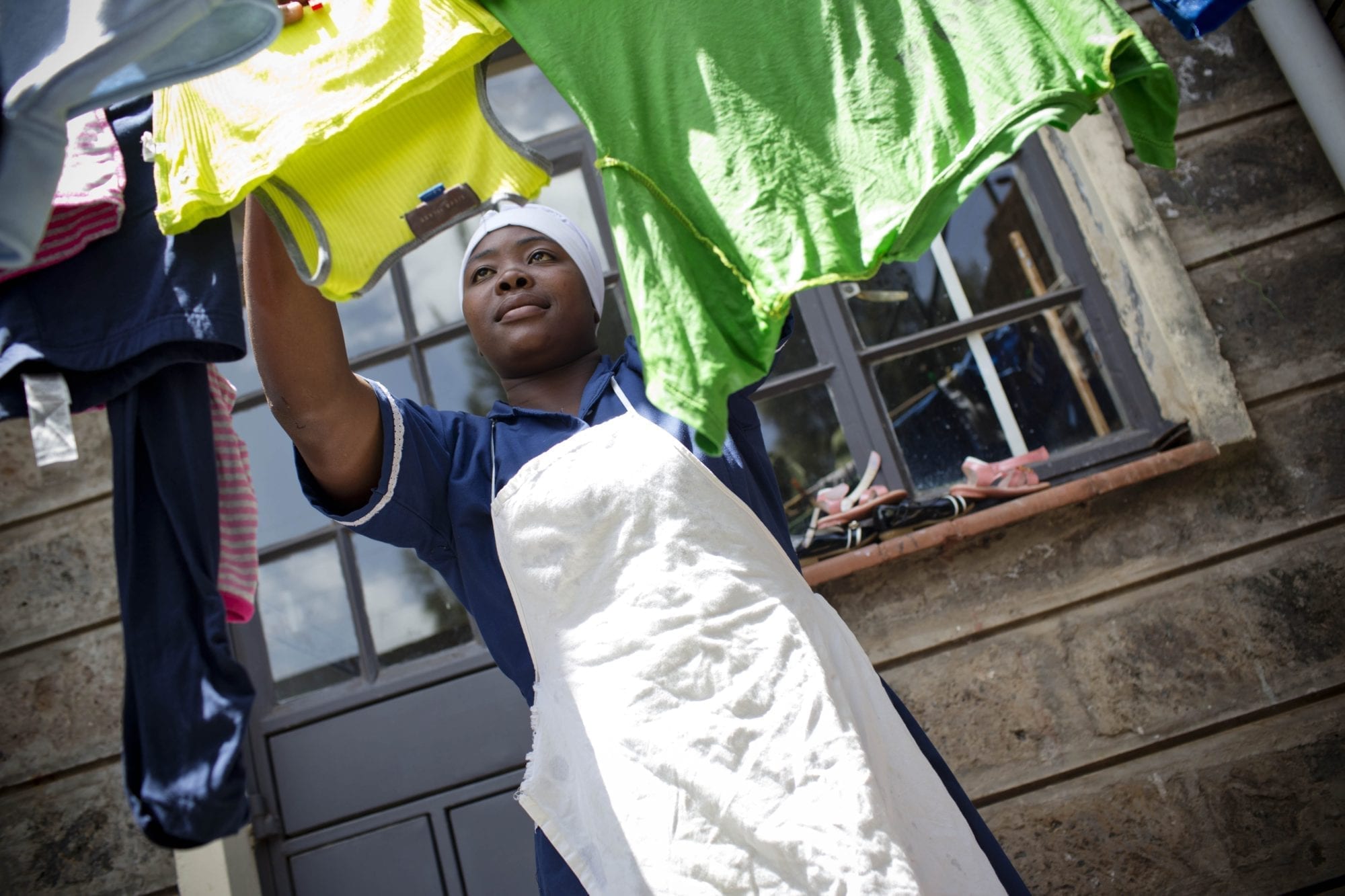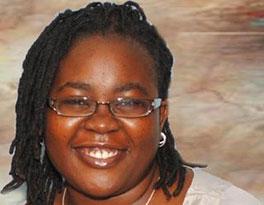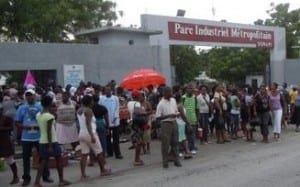
Nov 2, 2016
While all work has value, not every job is a “good job.” Millions of jobs around the world do not offer the social protections or the sense of dignity that allow workers to enjoy the benefits of their own hard work. The Solidarity Center partners with unions and other allies to empower workers around the world to achieve decent work together.
A new Solidarity Center photo essay showcases the success stories of many of the Solidarity Center’s allies in attaining decent work in industries around the world.
Make Every Job a Good Job: Workers Achieve Decent Work Together, celebrates the efforts of working people as they organize and fight for better wages, safer working conditions and other protections on the job.

Sep 12, 2014
Up to 80 percent of workers across Africa labor in the informal economy, many as street vendors, taxi drivers and domestic workers. With few legal rights, most informal-sector workers make low wages and have no health care or other social protections.
Because women comprise the vast majority of workers in the informal economy, they are integral to improving wages and working conditions for all informal workers. Indeed, says Caroline Mugalla, executive secretary of the East Africa Trade Union Confederation (EATUC): “The key to development in Africa is empowering women.”
Mugalla traveled to Washington, D.C., in August, where she and nearly 40 African trade union leaders met to ensure participants in the high-level U.S.-Africa Summit included “decent work” on their agenda. Although “Africa rising” has become a popular catchphrase for the continent’s economic momentum, only the top 1 percent are benefiting. Most Africans are unable to secure decent work—which includes good wages, safe working conditions and the freedom to form unions and collectively bargain.
For many unions, the first step to empowering women workers is addressing their own power structures, a process Mugalla led for several years within the EATUC, a regional confederation that includes labor federations in Burundi, Kenya, Rwanda, Somalia, Tanzania, Uganda and Zanzibar. EATUC’s constitution was “silent on the issue of gender,” Mugalla said, so in 2009, she and others began drafting language to ensure gender equality became a key part of it.
Over the next three years, union leaders hosted regional committee meetings with women to hear their concerns and develop recommendations for the EATUC governing body. The International Labor Organization (ILO) and Solidarity Center held leadership trainings for women and assisted union leaders in crafting new language for the constitution. The union women also held the all-male general secretaries accountable for approving it, says Mugalla.
Now with passage of the new constitution, Mugalla says “women need to be trained at the shop floor so they can become leaders—stewards, regional officers, national officers.”
In reaching out to workers in the informal economy, unions in East Africa provide an opportunity for women to share in the region’s prosperity. Tanzania unions have organized female street vendors who sell beads, sandals, wood carvings and other crafts, providing them with valuable information on the market price for their goods. “Women make up the majority in East Africa, make up the majority of people living below the poverty line,” says Mugalla. “A woman who is economically empowered can made decisions on her own.”
As a collective trade union voice in East Africa, EATUC is pressing for strong worker protections in trade agreements such as the African Growth and Opportunity Act (AGOA). AGOA, which gives eligible sub-Saharan countries duty-free access to the U.S. market for a variety of products, is up for re-authorization in 2015. In the 15 years AGOA has been in effect, it has increased exports from sub-Saharan Africa, but by focusing mostly on tariff reductions, it has not spurred broader development or fostered a robust and equitable economic system, Mugalla says.
AGOA covers products made in the textile sector, which is nearly entirely composed of women workers. The EATUC is working to ensure AGOA and other such agreements do not increase the number of low-skilled jobs but provide women and young workers “employment that gives them the opportunity to access social services, job security,” says Mugalla.
Empowering women economically, fundamental to advancing progress across Africa, can only happen when gender equality is recognized across the board. Or as Mugalla says:
“The day that gender becomes a man’s issue is the day we have made a lot of progress.”
Aug 8, 2014

Kwasi Adu-Amankwah, ITUC-Africa general-secretary, highlighted the need for jobs and worker rights this week in Washington, D.C. Credit: RadioLabour
During this week’s U.S.-Africa Summit with heads of state in Washington, D.C., more than 40 African trade union leaders took part in parallel meetings to call on U.S. and African leaders to adopt a decent work agenda for trade and economic growth.
In interview with RadioLabour, Kwasi Adu-Amankwah, general-secretary of the International Trade Union Confederation-Africa, discussed the focus on decent work
“Decent work … refers to the need for employment, but when people are employed, they have to have rights,” Adu-Amankwah said.
“Employment is one pillar of decent work, and the existence of worker rights also is another pillar,” Adu-Amankwah said, citing social protection as the third part of a decent work agenda.
“Then there is a question of social dialogue—when people are at work, they must have rights to speak out. So they must be able to organize and to bargain collectively.”
Adu-Anamkwah also spoke at the official Africa Summit civil-society side event, “Promoting Decent Work: Priorities for U.S. and African Leaders, Civil Society and Private-Sector Shareholders.”
Listen to the full interview.
Feb 26, 2013

Workers outside SONAPI Industrial Park, Port-au-Prince, rallying for decent pay on October 8, 2012. Credit: Susan Washington.
Three years after the devastating 2010 earthquake, Haitian workers are organizing to ensure that foreign investment and infrastructure-targeted aid provide not just subsistence-level jobs, but decent work and a living wage for Haitians.
“We don’t want ‘Haiti Open for Business’ to become ‘Haiti for Sale,’ said Etant Dupain, a Haitian journalist and director of the community organization, Bri Kouri Nouvel Gaye (Noise Travels, News Spreads). Dupain relayed his concerns at a recent panel discussion in Washington, D.C., focusing on worker and community empowerment programs designed to enable Haitians to have a voice in their country’s redevelopment process. The panel was organized by the Solidarity Center and TransAfrica.
Panelists worry that average Haitians—still trying to recover from a series of disasters and a long history of economic and political setbacks—are getting lost in the rush of money and plans from foreign investors and donors, who have not always consulted with Haitians about what is needed. In order to play a stronger role in civil society, Haitian unions are very focused on the need to inform, educate and mobilize workers and the community about their right to participate in the workplace and broader social debates that shape their lives, especially with respect to new economic developments in the country.
Construction of new infrastructure and factories has begun, though hundreds of thousands of people remain homeless. Encouraged by valuable tax and other incentives, including low wages, garment and light-manufacturing tenants are moving into new and existing industrial parks.
International donors and the Haitian government say they want to provide jobs for Haitians. And jobs are sorely needed, said Susan Washington, Solidarity Center country program director in Haiti.
“Haitians are used to working hard; they want jobs. But they must have the right to make these good jobs. Good jobs pay a living wage, respect the right of workers to organize and bargain collectively with employers.”
In March 2011, the Solidarity Center published a living wage survey which found that prices for necessities and basic goods were out of reach for most apparel workers. This remains true today: The cost of living has increased while wages, for those lucky enough to have jobs in the formal economy, have stagnated.
One potential area for job creation is the new Caracol Industrial Park in northern Haiti, which was inaugurated and began initial operations in late 2012. Established as a consequence of trade preferences established under the U.S. Congress’s passage of the HOPE II Act of 2008 and the Haiti Economic Lift Program (HELP) Act of May 2010, Caracol is supposed to support up to 65,000 permanent jobs over time and increase Haitian garment industry related jobs by more than 200 percent. The Solidarity Center estimates that 1,500 workers currently are employed in Caracol, and there are now two registered unions.
Solidarity Center partners are concerned that the park will not create jobs paying workers sufficiently to support their families and rebuild their lives and their country. Caracol is being presented as a model, said Etant Dupain. “If everyone has a place at the table it will be a great project,” he said. But if regulations are not followed and enforced it will set an unfortunate precedent for new industrial processing zones and industrial parks in Haiti.
To help ensure that Haitians have a greater voice in the future of their country, Haitian unions are increasing their capacity to participate in several forums involving the government, employers and civil society. Their participation in these venues is supported by the work of the Solidarity Center and the International Trade Union Confederation -Trade Union Congress of the Americas (ITUC-TUCA) as well as by community organizations supported by TransAfrica’s Let Haiti Live project.
Through their unions, Haitian workers are focused on three key areas: worker and citizen capacity building, social dialogue and labor code reform.
Building Worker and Citizen Capacity: By strengthening the capacity of workers and the community to advocate for and defend their interests through outreach, leadership development and organizing, unions will be well-positioned as independent, democratic and self-sustaining organizations to lead the drive for a better life for Haitian families.
Social Dialogue: Union leaders participate in monthly meetings of a Social Dialogue Table – a tripartite mechanism convened by the International Labor Organization’s (ILO’s) Better Work Haiti project that monitors the factories and provides factory-by-factory data for the ILO’s biannual worker rights compliance reports. Under the auspices of the Commission Tripartite de la Mise en Oeuvre de la loi HOPE—also known as the CTMO-HOPE Commission—union leaders participate in tripartite discussions seeking to resolve problems in the textile and apparel sector in Haiti that are not resolved at the factory level. The Solidarity Center and ITUC both have official observer status in these meetings to lend support to the unions’ perspectives. Both organizations are also providing technical assistance to Haitian unions to raise their capacity to effectively participate in social dialogue.
Labor Code Reform: Haitian unions are active participants in the labor code reform process that is being directed by the ILO. Unions convened workers across all sectors and also worked closely with community associations to gather data for worker input into the tripartite process. Through this process, the trade union movement, employers and the Haitian government have each presented formal proposals to the ILO for changes to the current labor code. The unions’ proposal calls for provisions for the new Haitian Labor Code such as: respect for freedom of association and collective bargaining; distribution of the labor code in Creole; a national minimum wage by sector; coverage of workers across all sectors, including informal and agricultural workers; improved social protections for Haitians, including disability insurance, pensions and health care; banning all forms of discrimination in the workforce; establishment of a viable mechanism for enforcement of the labor code; a small payroll tax to fund capacity building for workers to advocate for their interests; protection of domestic workers; capacity building for government labor officials and the establishment of regional government labor offices.
Oct 22, 2012
Garment workers at Zilani Apparels Ltd., in Rampura, Dhaka, Bangladesh, formed a union in August with the help of the Bangladesh Federation of Workers’ Solidarity (BFWS) and now are waiting for the Labor Department to register it. More than 50 percent of the 350 garment workers at Zilani Apparels have joined together after recognizing that their individual efforts to improve wages and working conditions were not effective, says Fatema, a committee member.
“We raised our problems individually with management so many times… but they never listened to us,” Fatema said.
The workers, who make men’s and women’s shirts for export to the United States and Europe, say low wages and an unfair salary scale are their biggest concerns.
“We are not getting the amount which we are supposed to get,” says Maksuda, joint secretary of the proposed union. “We receive a lower salary than new workers, even though we are more capable.”
Wage discrimination is common, according to Jakia, publicity secretary of the proposed union. “I am very skilled in my work and have been working in the garment industry for 15 or 16 years, and with Zilani for four years. Many times I requested a salary increase. But management told me that they won’t increase my salary like others because they know my involvement with the union.” Jakia says the company transferred her to another production floor and gave her a new starting date to avoid providing benefits.
The garment workers also must confront a lack of job security. Once hired, they say management demands their signatures on blank pieces of paper, which the workers fear will be used to trump up charges if the company wants to fire them.
Although pregnant workers often are either terminated or forced her to resign and typically receive no maternity benefits, the workers won their first victory as a united team in August when they helped a woman get maternity benefits. Parvin, a seven-year employee, was eight months pregnant when management tried to force her to resign. Her co-workers requested that she receive the maternity benefits to which she was entitled. When the company refused, the workers sent a notice to the factory through BFWS. After receiving the notice, management paid her maternity leave.
The garment workers realized they needed to form a union when they attempted a work stoppage in May to force management to discuss their concerns. After a manager convinced most of the line workers to return to the job, says Rubina, who was elected president of the proposed union, “all of us realized that we need to be united to achieve our demands and we need to do something else which is effective.” That is when they met with BFWS.
Since then, leaders of the effort to unionize encouraged co-workers to join the union and continued to press for annual leave payment and a salary increase. On August 1,they again stopped work to get management to talk with them. But this time, they had the BFWS to support them. The Bangladesh Garment Manufacturers & Exporters Association (BGMEA) also joined the discussions, and workers and management ultimately signed a 16-point agreement. Management has so far only implemented two of the 16 requests, including paying some annual leave and a bonus for the Muslim holiday of Eid ul Fitr.
Like those at Zilani, garment workers across Bangladesh are taking a stand for decent work. In response, police fire rubber bullets and tear gas at workers rallying outside their workplaces.
Despite the significant obstacles to forming a union, at Zilani, the workers remain optimistic and hopeful about the changes they can make and the new strength they will have with a union.
“We know that getting union’s registration will not be easy, but we will not give up until seeing it through,” says Ruhul Amin, BFWS general secretary.




